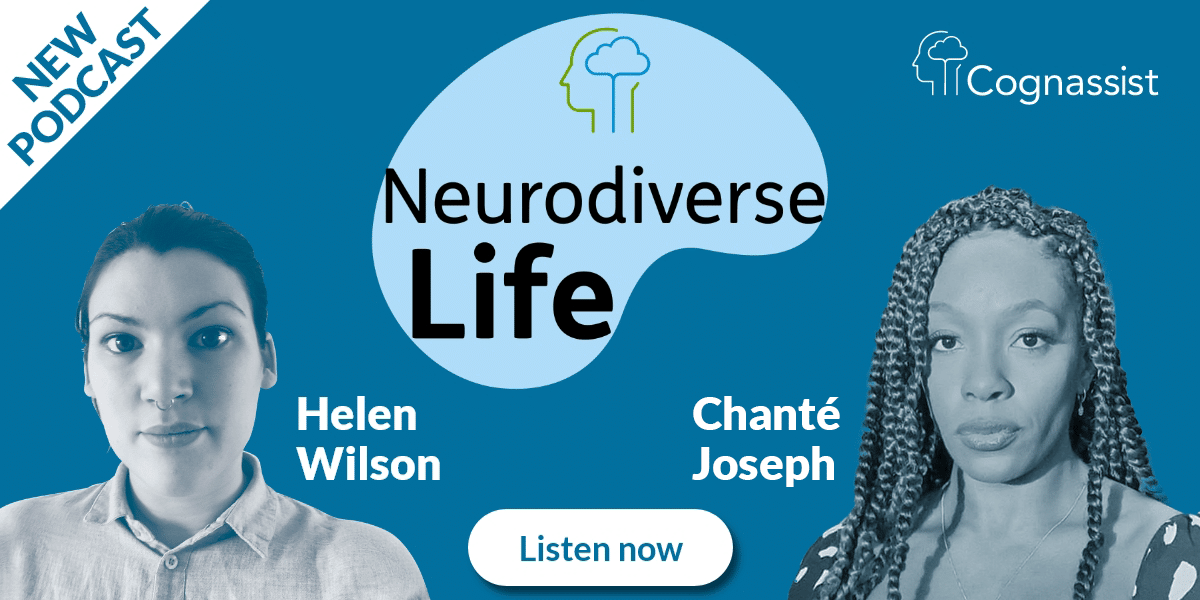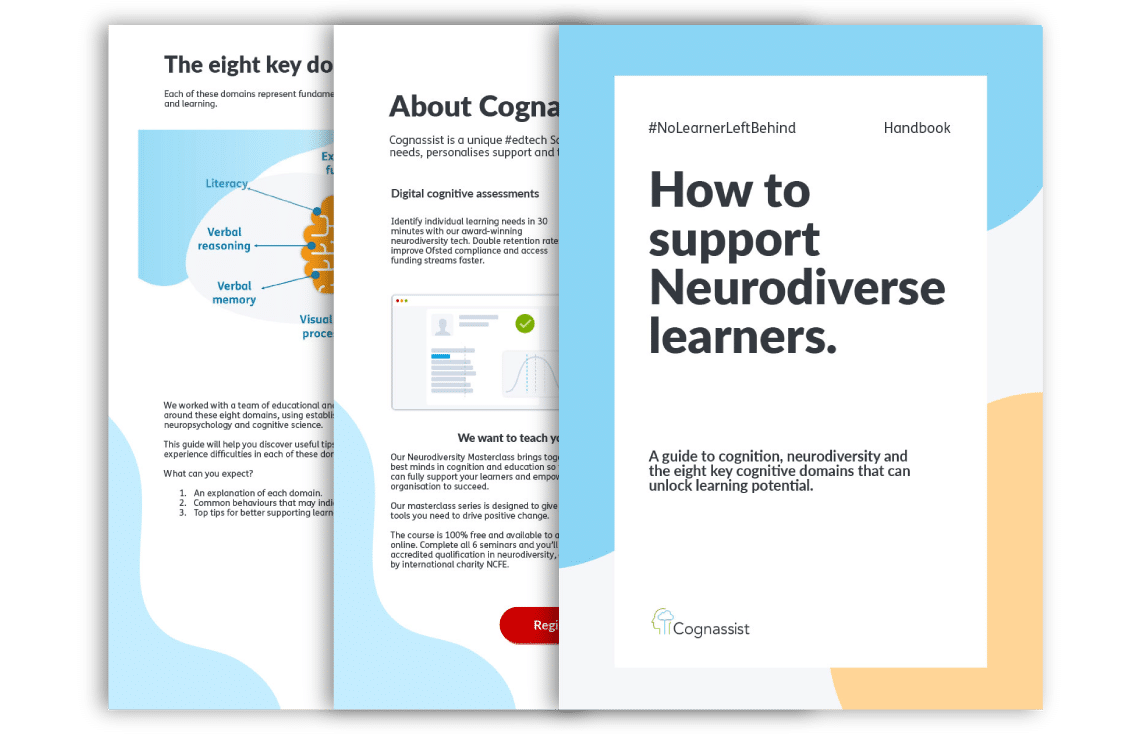Underresearched & Undiagnosed
For our Underresearched & Undiagnosed campaign, we’re working with writer and broadcaster Chanté Joseph to raise awareness of the fact that certain sectors of society, such as women and people of colour, are far less likely to have their neurodiversity diagnosed. For example, in the UK, it has been found that Asian school pupils are half as likely to be identified with autistic spectrum disorders (ASD) as white British pupils. Black people also tend to be diagnosed later and less often, and are frequently misdiagnosed: autism tends to be misdiagnosed as ADHD or Oppositional Defiant Disorder. Coupled with the fact that women, and especially BAME women, are much more likely to engage in ‘masking’ – when someone hides the true extent of their symptoms – it’s even more apparent that there’s a real lack of focus on them as a demographic. Together, we’re encouraging those who think they are neurodiverse to seek support and prompt employers and other institutions to offer this to them.

Podcast: Neurodiverse Life – Journey to success
Join Cognassist Science Communications Manager Helen Wilson, in conversation with Chanté Joseph.
Chanté Joseph is known for her wit, community activism and successful career as a writer, content creator, and TV presenter. Less known, however, is the difficulty she faced on her path to success. Only receiving a diagnosis of ADHD in October 2020, Chanté struggled from childhood throughout education and into her adult life to conform to one-size-fits-all work and learning environments. Her relationships and friendships also took a toll from her RSD (rejection sensitive dysphoria) as a result of her ADHD.
In her school years, she found it difficult to focus on her learning, especially when it came to repetitive tasks. What’s more, being a young Black girl, her hyperactivity and distraction was dismissed as poor behaviour, with teachers labelling her as a “bad student”. Despite this, Chanté found that outside the constraints of academia she flourished, taking part in extracurricular activities such as leading community activism and volunteering initiatives, as well as cheerleading, dance, and music.
Her strengths lay in her creativity and public speaking, and although her brilliance is now evident, the overlooking of Chanté (and many other people like her) in neurodiversity can be attributed to a number of reasons. Firstly, Chanté’s personal identity doesn’t fit the current public perception of what a person with ADHD looks like. In media and conversations around the condition, the image evoked is often of a white boy with an inability to sit still in class; wrongly, ADHD is imagined as a behavioural issue and often treated as such.
Furthermore, literature and research around neurodiversity holds the work of predominantly white, male researchers who often use participants that reflect their identities as gospel. Research has historically overlooked women and those from differing ethnic backgrounds, with results from a select group of participants assumed as the status quo – though this is not an issue unique to neurodiversity.
Secondly, Chanté believes her extracurricular accomplishments were subconscious excuses by educators as to why “there was nothing wrong with her”, even though her severe struggles were causing a dependency on caffeine pills as she attempted to study for 12 hours daily. Unfortunately, ADHD and other learning conditions are sometimes viewed through a lens of absolutism that assumes these individuals will struggle in every area of life. Achievements such as Chanté’s are therefore seen as justifications for non-diagnosis. The reality is, ADHD or other neurodiverse conditions are no indication of the intellect or level of success that an individual can achieve.
Her difficulties focusing didn’t end after university, with Chanté struggling in her internships within business environments such as Google and the Bank of England. At Google, the free food, yoga, gym, and sleep pods, amongst other ‘work perks’, were exciting for many interns, but a nightmare for Chanté who found herself overstimulated and struggling to focus during work hours. Her experiences, especially with management that didn’t recognise her struggles, reminded her of her time in school – leaving her feeling small and low on confidence.
Her diagnosis came after a string of internships, while at her longest full-time job at an agency. She had seen online the experiences of other Black women who also struggled with ADHD during the pandemic, prompting her to go for an assessment. Her employer at the time covered the costs of the assessment, but the process took so long that by the time she had completed it and received her diagnosis, she had left her job.
Since then, Chanté has worked on a freelance basis, which she says gives her more control over how she works outside the rigid structures of a typical work environment. She’s since gone on to take on projects in journalism, broadcasting, social media, panel hosting and a plethora of events. Her diagnosis hasn’t solved all her issues – finding medication and therapy that works for her has been time-consuming and expensive – but it has helped her to understand her body better, recognise when she’s “drifting away” and take the steps to realign herself. She credits medication, therapy and her community of neurodiverse Black women for the progress she’s been able to make in managing her ADHD.
On advice she would share with those in a similar position, “I know it becomes really difficult to separate yourself from these really horrible things, because you just don’t believe that you’re working hard enough. But actually, you are, and you just work differently. Once you get into the groove of understanding what works for you, it will be amazing. But first, you have to be kind, and you have to be honest. And it’s not stuff that you have to show other people necessarily, but just to yourself. Listen to your body more, and be kind.”
Partnership with the BAME Apprentice Network
Cognassist are very excited to announce the launch of their partnership with the BAME Apprentice Network. The BAME Apprentice Network are dedicated to closing the diversity gap in apprenticeships, a cause we are totally aligned with.
More info to come soon!
Chanté’s Top Tips
- Take the pressure off
I struggled so much in education because I felt I was studying the same amount as my friends – if not more – yet I couldn’t concentrate or take things in. I spent 12 hours a day in the library, powered by caffeine tablets and energy drinks, and nothing helped. Taking a break can sometimes be the most helpful thing you can do in that situation. Walk to the kitchen and have a snack or have some fruit, switch tasks for an hour, or even go for a walk or run – you’ll probably find you come back with a much clearer mind.
- Being realistic with yourself is the best form of self-care
Before my diagnosis, I would set completely unrealistic tasks for myself, like reading ten chapters of a book at a time. After two chapters, anyone would be tired, but I really beat myself up about it and told myself I wasn’t doing enough. I think the key is being radically honest with yourself and not thinking about ‘laziness’, how much you think you can achieve in a certain amount of time, or what other people expect from you. Think about what you can actually do for yourself and set out to achieve it.
- Work in environments that work for you
In my second year of university, I did an internship at Google. The thing about Google is that it’s a giant, colourful building with beanbags, free food, yoga, a gym, sleep pods and so much more. I was so overstimulated and my concentration really suffered. Now that I’m working from home, I have my desk space set up in a way that helps me to focus. I have my timer and a whiteboard to note down ideas and plans, and I have a fidget toy to help me when I’m reading through long documents. Take some time to understand how you work best and the types of environments that feel nurturing to you. Only you can create that because you know what works best in your own mind.
- Know what your body needs
I found my ADHD medication caused issues with my appetite, which led to erratic eating habits. Sometimes, too, when I’m in ‘hyperfocus’ mode, I don’t want to break that to spend an hour cooking and have to start working again later. I’ve started using services like Chefly, which provides healthy, chef-cooked pre-prepared meals so I can make sure I’m eating well and managing my time.
- Find a community
The Internet has been a huge help. There are so many people who write blogs and sell products that are for people with ADHD. I’ve been able to find a huge online community of other Black women who are going through exactly the same thing as I am – it’s really helped to reassure me and means I can get advice from someone in my position.
Resources
From Chanté:
- Black Girl Lost Keys (as mentioned on the Neurodiverse Life podcast)
- ADDitude
- The Tiimo App
- ADHD Babes
- Adulting ADHD
- On TikTok, I’m constantly hunting for ADHD trends!
From Cognassist:
Handbook: How to support Neurodiverse learners
Download the handbook for access to information that can help you to identify and support Neurodiverse traits in either yourself or someone you know.
If you’re interested in the handbook but don’t have a work or education email address, just let us know at marketing@cognassist.com

